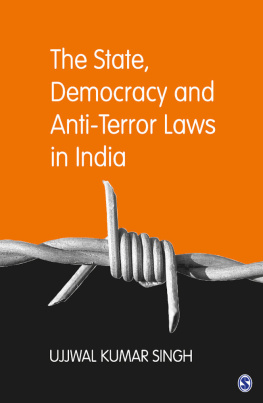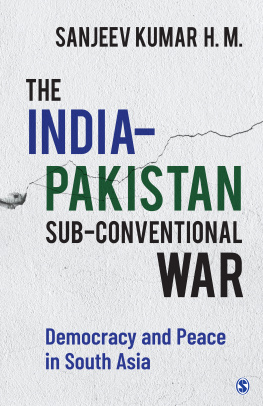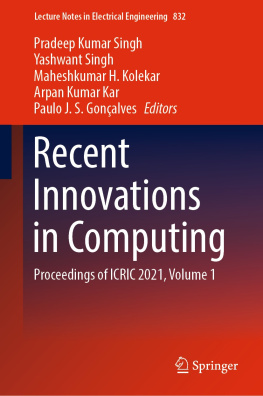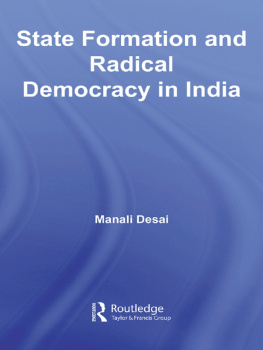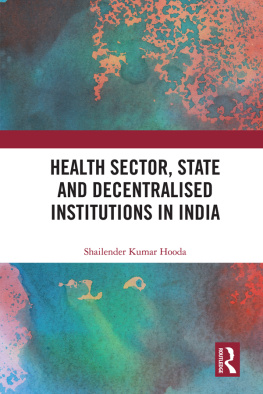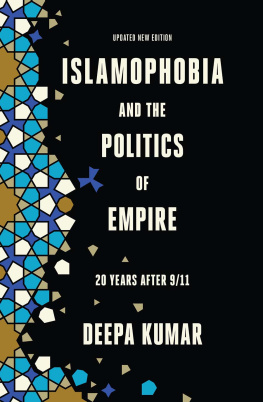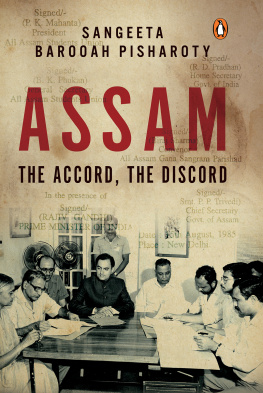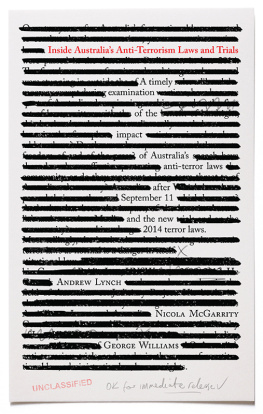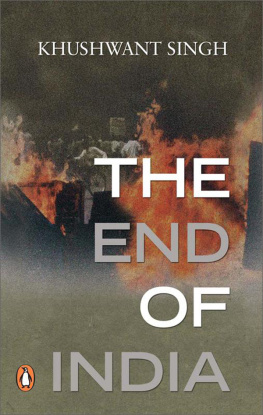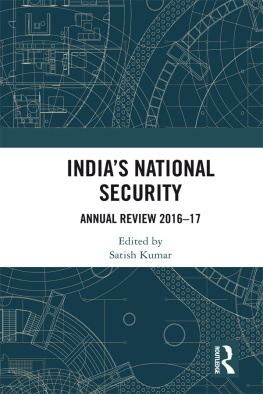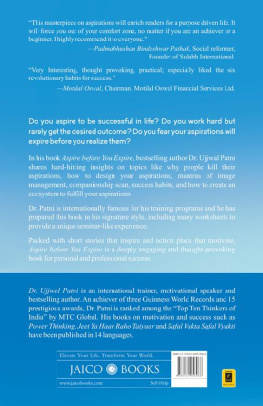Ujjwal Kumar Singh - The State, Democracy and Anti-Terror Laws in India
Here you can read online Ujjwal Kumar Singh - The State, Democracy and Anti-Terror Laws in India full text of the book (entire story) in english for free. Download pdf and epub, get meaning, cover and reviews about this ebook. year: 2007, publisher: SAGE Publications, genre: Politics. Description of the work, (preface) as well as reviews are available. Best literature library LitArk.com created for fans of good reading and offers a wide selection of genres:
Romance novel
Science fiction
Adventure
Detective
Science
History
Home and family
Prose
Art
Politics
Computer
Non-fiction
Religion
Business
Children
Humor
Choose a favorite category and find really read worthwhile books. Enjoy immersion in the world of imagination, feel the emotions of the characters or learn something new for yourself, make an fascinating discovery.
- Book:The State, Democracy and Anti-Terror Laws in India
- Author:
- Publisher:SAGE Publications
- Genre:
- Year:2007
- Rating:3 / 5
- Favourites:Add to favourites
- Your mark:
- 60
- 1
- 2
- 3
- 4
- 5
The State, Democracy and Anti-Terror Laws in India: summary, description and annotation
We offer to read an annotation, description, summary or preface (depends on what the author of the book "The State, Democracy and Anti-Terror Laws in India" wrote himself). If you haven't found the necessary information about the book — write in the comments, we will try to find it.
The State, Democracy and Anti-Terror Laws in India — read online for free the complete book (whole text) full work
Below is the text of the book, divided by pages. System saving the place of the last page read, allows you to conveniently read the book "The State, Democracy and Anti-Terror Laws in India" online for free, without having to search again every time where you left off. Put a bookmark, and you can go to the page where you finished reading at any time.
Font size:
Interval:
Bookmark:
The State, Democracy and
Anti-Terror Laws in India
The State, Democracy and
Anti-Terror Laws in India
Ujjwal Kumar Singh

CopyrightUjjwal Kumar Singh, 2007
All rights reserved. No part of this book may be reproduced or utilized in any form or by any means, electronic or mechanical, including photocopying, recording or by any information storage or retrieval system, without permission in writing from the publisher.
First published in 2007 by
| SAGE Publications India Pvt Ltd B1/I-1 Mohan Cooperative Industrial Area Mathura Road, New Delhi 110 044, India www.sagepub.in SAGE Publications Inc 2455 Teller Road Thousand Oaks, California 91320, USA SAGE Publications Ltd 1 Olivers Yard, 55 City Road London EC1Y 1SP, United Kingdom SAGE Publications Asia-Pacific Pte Ltd 3 Church Street #10-04 Samsung Hub Singapore 049483 |
Published by Vivek Mehra for SAGE Publications India Pvt Ltd, typeset in 10/13 Aldine401 BT by Star Compugraphics Private Limited, Delhi and printed at Avantika Printers, New Delhi.
Library of Congress Cataloging-in-Publication Data
Singh, Ujjwal Kumar.
The state, democracy and anti-terror laws in India/Ujjwal Kumar Singh.
p. cm.
Includes bibliographical references and index.
1. TerrorismIndiaPrevention. 2. India. Prevention of Terrorism Act, 2002. Civil rightsIndia. 4. Internal securityIndia. I. Title.
KNS4352.S56344.5405325dc2220072006034731
ISBN: 978-93-5280-076-6 (ePub)
SAGE Team: Anindita Majumdar, Sandeep Bankhwal and Santosh Rawat
Thank you for choosing a SAGE product!
If you have any comment, observation or feedback,
I would like to personally hear from you.
Please write to me at
Vivek Mehra, Managing Director and CEO, SAGE India.
Bulk Sales
SAGE India offers special discounts
for purchase of books in bulk.
We also make available special imprints
and excerpts from our books on demand.
For orders and enquiries, write to us at
Marketing Department
SAGE Publications India Pvt Ltd
B1/I-1, Mohan Cooperative Industrial Area
Mathura Road, Post Bag 7
New Delhi 110044, India
E-mail us at
Get to know more about SAGE
Be invited to SAGE events, get on our mailing list.
Write today to
This book is also available as an e-book.

CONTENTS
Writing this book, first in segments, which were subsequently woven together into a wider canvas, was a learning experience. Sitting through court hearings, getting familiar with legal documents, procedures and the language of the courts, and examining legal-political issues from a social scientific perspective involved straddling different, often conflicting vocabulary and domains of expertise. In this process of comprehending and adapting myself to new tools, I received support and encouragement from a range of peoplefriends, colleagues, and sometimes, total strangers, who were forthcoming with suggestions and help. To all of them I express my heartfelt gratitude. The incisive comments and suggestions by the anonymous referee helped me strengthen my arguments in some places and fill in the gaps in others. I have derived inspiration from the praxis-oriented writings of Upendra Baxi. Randhir Singh, Manoranjan Mohanty and Sarah Joseph were always a source of strength. I am indebted to fellow activists of Peoples Union of Democratic Rights (PUDR) for the selfless camaraderie and the space the organisation provides for debates and discussion. I am grateful to Nitya Ramakrishnan, Seema Gulati and Devendra Jha who helped clarify legal intricacies and access documents and judgements. I thank Lallan Baghel, Nandini Sundar and Pratiksha Baxi for the various discussions we had on issues of shared concerns, and Biswamoy Pati for his constant encouragement. To Mimi Chowdhury, then at Sage, I owe special thanks for having faith in this project and propelling it forward with gentle persuasion and firm reminders. I thank Ashok Chandran and the Sage team for taking care of the manuscript upon completion. Thanks also to the Political Science Department, Panjab University for giving me leave which was partially utilised for preparing this manuscript.
I presented parts of my work in conferences organised in Paris by the Network for the Study of South Asian Politics and Political Economy (NETSAPPE) and Maison des Sciences de Lhomme (MSH), respectively. I thank the organisers for giving me the forum to discuss my work, in particular, Ashok Acharya, Pradeep Chibber, Peter deSouza, Leela Fernandes, Niraja Gopal Jayal, Zoya Hasan, Gurpreet Mahajan, Pratap Bhanu Mehta, Sandro Mezzadra, Ranabir Sammadar, Shylashree Shankar, Giles Tarabout, Ashutosh Varshney and Yogendra Yadav for their suggestions and comments. I also thank the Nehru Memorial Museum and Library, New Delhi; Department of Political Science, and the Developing Countries Research Centre, University of Delhi; Centre for Political Studies and the Centre for the Study of Law and Governance, Jawaharlal Nehru University; Political Science Department and Sociology Department, Panjab University; Political Science Department, M.S. University, Baroda; Political Science Department, Jammu University and Critique, a students discussion forum in Panjab University, for giving me the opportunity to present my work and interact with students and scholars at workshops, conferences and seminars. I am grateful to the staff of Nehru Memorial Museum and Library, New Delhi; Central Reference Library, Panjab University, Chandigarh; Ratan Tata Library, and Central Reference Library, Delhi University; Library System of Delhi UniversitySouth Campus; Bar Library, Supreme Court, New Delhi and Patiala House Courts for facilitating my access to their resources and records.
My family, I thank for their unflinching support and affection. Anatya and Anupama have journeyed with me through this work, sharing my anxieties on the way, and the joys of completion. Anupama read and commented on each draft and the final manuscript bears the imprint of the conviction and understanding of both of us. My parents, Lalita and Krishna Ballabh Sinha always encouraged me to think independently and supported me in my endeavours and decisions in life. I dedicate this book to them.
ABNES | Akhil Bharatiya Nepali Ekta Samaj |
ACMM | Additional Chief Metropolitan Magistrate |
ACP | Assistant Commissioner of Police |
AFSPA | Armed Forces Special Powers Act |
AIADMK | All India Anna Dravida Munnetra Kazhagam |
AIPRF | All India Peoples Resistance Forum |
AIR | All India Reporter |
AISAD | All India Shiromani Akali Dal |
APDP | Association of Parents of Disappeared Persons |
ATTF | All Tripura Tribal Force/All Tripura Tiger Force |
BJP | Bharatiya Janata Party |
BSF | Border Security Force |
BSP |
Font size:
Interval:
Bookmark:
Similar books «The State, Democracy and Anti-Terror Laws in India»
Look at similar books to The State, Democracy and Anti-Terror Laws in India. We have selected literature similar in name and meaning in the hope of providing readers with more options to find new, interesting, not yet read works.
Discussion, reviews of the book The State, Democracy and Anti-Terror Laws in India and just readers' own opinions. Leave your comments, write what you think about the work, its meaning or the main characters. Specify what exactly you liked and what you didn't like, and why you think so.

